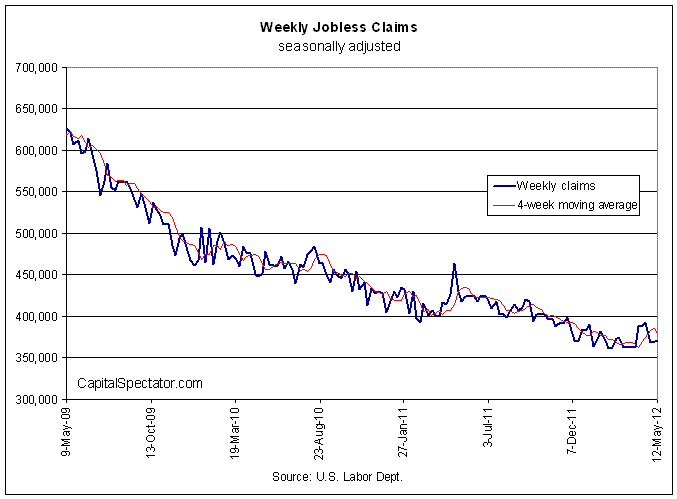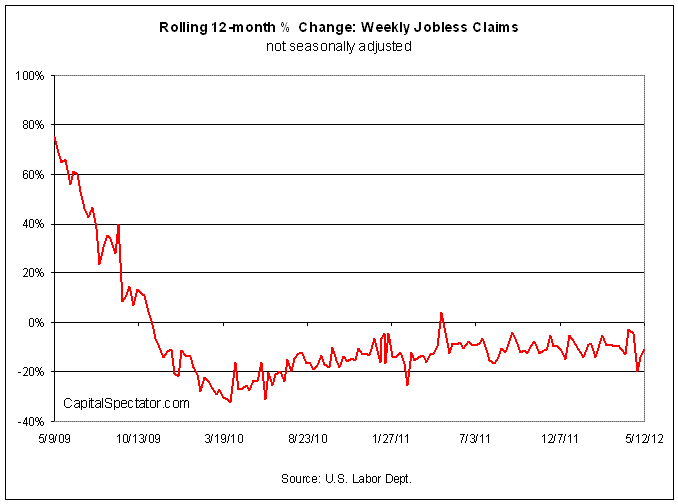No news is still good news for jobless claims. The risk that the labor market’s revival has stalled is still on everyone’s mind, but there’s nothing ominous in today’s update on new filings for unemployment benefits. Claims were flat last week, holding steady at a revised 370,000 on a seasonally adjusted basis. The number du jour is a yawn, and for the time being that’s ok. Treading water has a short shelf life for inspiring confidence, but for the moment a broader review of the numbers continue to suggest that job growth will roll on.
One reason for thinking positively is that the four-week moving average of new claims fell for the second straight week and is near its post-recession low. That’s a sign that the downward momentum for this series remains intact. You can't tell much from any one report for this series, but the trend is more reliable and for the time being the trend still appears inclined to be friendly.
The year-over-year decline in new claims on an unadjusted basis still looks encouraging too. This is a valuable metric because it strips out seasonal adjustment and provides a clearer picture of the trend in new claims. The good news is that there's still a robust bias for declines. If and when the year-over-year profile turns sharply higher for a sustained period, the party is likely to be over. But for the moment, at least, we're still comfortably below zero.
Skepticism abounds, however, in part because the weak growth in April’s payrolls report, which followed a disappointing update for March. But yesterday's strong industrial production reading for April implies that job growth will improve in May. The fact jobless claims aren't rising strengthens the case for thinking that the labor market won't surrender to the cycle's darker forces.
"Over the past two weeks is the first time that there was evidence that claims had come back down from the troubling increase that we saw over April," advises Ellen Zentner, senior U.S. economist at Nomura Securities. "This is the third straight week that claims have remained lower, definitely proving that April was an anomaly."
"Definitely" isn't a word I'd use, although I understand Zentner's point. But stagnation in weekly claims won't get a pass for much longer. Some dismal scientists are already uneasy about the implications. “This is just a steady moving along, claims are not getting worse at least,” says Yelena Shulyatyeva, an economist at BNP Paribas. “We need to see more hiring. We don’t see that happening yet.”
- English (UK)
- English (India)
- English (Canada)
- English (Australia)
- English (South Africa)
- English (Philippines)
- English (Nigeria)
- Deutsch
- Español (España)
- Español (México)
- Français
- Italiano
- Nederlands
- Português (Portugal)
- Polski
- Português (Brasil)
- Русский
- Türkçe
- العربية
- Ελληνικά
- Svenska
- Suomi
- עברית
- 日本語
- 한국어
- 简体中文
- 繁體中文
- Bahasa Indonesia
- Bahasa Melayu
- ไทย
- Tiếng Việt
- हिंदी
Jobless Claims Were Unchanged Last Week
Latest comments
Loading next article…
Install Our App
Risk Disclosure: Trading in financial instruments and/or cryptocurrencies involves high risks including the risk of losing some, or all, of your investment amount, and may not be suitable for all investors. Prices of cryptocurrencies are extremely volatile and may be affected by external factors such as financial, regulatory or political events. Trading on margin increases the financial risks.
Before deciding to trade in financial instrument or cryptocurrencies you should be fully informed of the risks and costs associated with trading the financial markets, carefully consider your investment objectives, level of experience, and risk appetite, and seek professional advice where needed.
Fusion Media would like to remind you that the data contained in this website is not necessarily real-time nor accurate. The data and prices on the website are not necessarily provided by any market or exchange, but may be provided by market makers, and so prices may not be accurate and may differ from the actual price at any given market, meaning prices are indicative and not appropriate for trading purposes. Fusion Media and any provider of the data contained in this website will not accept liability for any loss or damage as a result of your trading, or your reliance on the information contained within this website.
It is prohibited to use, store, reproduce, display, modify, transmit or distribute the data contained in this website without the explicit prior written permission of Fusion Media and/or the data provider. All intellectual property rights are reserved by the providers and/or the exchange providing the data contained in this website.
Fusion Media may be compensated by the advertisers that appear on the website, based on your interaction with the advertisements or advertisers.
Before deciding to trade in financial instrument or cryptocurrencies you should be fully informed of the risks and costs associated with trading the financial markets, carefully consider your investment objectives, level of experience, and risk appetite, and seek professional advice where needed.
Fusion Media would like to remind you that the data contained in this website is not necessarily real-time nor accurate. The data and prices on the website are not necessarily provided by any market or exchange, but may be provided by market makers, and so prices may not be accurate and may differ from the actual price at any given market, meaning prices are indicative and not appropriate for trading purposes. Fusion Media and any provider of the data contained in this website will not accept liability for any loss or damage as a result of your trading, or your reliance on the information contained within this website.
It is prohibited to use, store, reproduce, display, modify, transmit or distribute the data contained in this website without the explicit prior written permission of Fusion Media and/or the data provider. All intellectual property rights are reserved by the providers and/or the exchange providing the data contained in this website.
Fusion Media may be compensated by the advertisers that appear on the website, based on your interaction with the advertisements or advertisers.
© 2007-2025 - Fusion Media Limited. All Rights Reserved.
